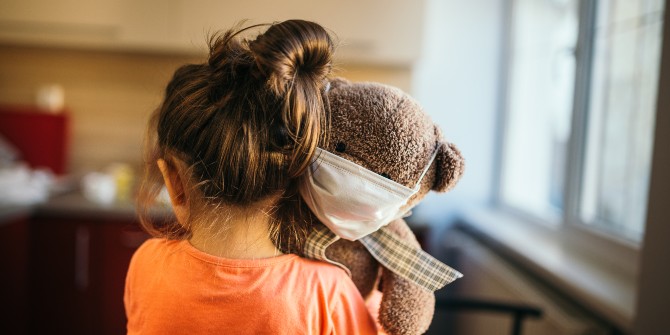More than a tenth of young people have lost their jobs during the pandemic, and only 38% of pupils were getting the equivalent of a full day’s schooling in lockdown. Lee Elliot Major (University of Exeter), Andrew Eyles (LSE) and Stephen Machin (LSE) warn that these losses will have a scarring effect: young people cannot simply ‘catch up’.
Even before the pandemic, young people were disproportionately affected by stagnating wages and declining social mobility. We surveyed over 10,000 of them to find out how their lives have changed since April 2020. Rather than focus solely on young workers, we considered the experiences of young people in higher education, school, university, and those beginning their labour market careers. The picture painted is bleak. Across the spectrum of education and work outcomes, there have been marked negative changes to the lives of young people. These are likely to have long-term consequences for their futures, unless the shocks they have faced are acted upon.
The first focus is on those aged 16-25 who were in paid work prior to lockdown. Unsurprisingly, and as in previous recessions, the young have struggled. Of those who were employees or self-employed in January/February, 11.1% have lost their jobs and a further 7.1% report working zero hours, despite not being made redundant. For comparison’s sake, of those aged 26 and above, 4.6% report having lost their job with 7.3% now working zero hours. The large discrepancy in job loss across age groups mean that those starting their labour market careers have borne the brunt of the economic impact so far.
As a significant portion of the young adults (aged 16-25) in the COVID generation are not in the labour market, we also assess how those in full time education (FTE) have been coping. A natural outcome to consider for this group is their education loss – what percentage of normal teaching hours have these students lost during lockdown?
We asked those in university, sixth form, and their final year of compulsory schooling how much teaching hours they were getting in lockdown relative to before and converted their answers into estimates of education losses. Those in FTE have experienced large falls in learning hours during lockdown, with an overall average fall of 48%. Splitting this number down further reveals that not everyone has been equally affected. Individuals from rich backgrounds, namely those who identify as coming from the top 20% of incomes, report a 42% fall in hours – this compares to a 52% fall reported by those from poor backgrounds (the bottom 20% of the income distribution).

Alongside learning losses for those in FTE, we combine our survey estimates with secondary data from Understanding Society to look at learning losses for school-age children during lockdown and afterwards, in September/October, when pupils had returned to school. Using estimates of school time and online/offline lessons offered during lockdown, we estimate that around 38% of students aged 4-18 experienced, on average, a full day’s worth of schooling during lockdown. Even in the period spanning the middle of September to October, when most pupils had returned to school, we find that only 59% are reported to be having a full day of education. Our findings show that learning losses have not only been large, but have persisted as lockdown restrictions have eased and schools have reopened. In parallel with our findings on FTE students, there are also divisions along socioeconomic lines. For instance, over 70% of privately educated students received a full day’s worth of schooling, compared with under 40% of their state school peers.
The young are struggling, irrespective of whether they are in work or in full time education. We emphasise that the inequalities in the labour market and in the education sector are the twin drivers of social mobility. Absolute mobility – the chance to be more prosperous than one’s parents – is driven by the young having greater labour market and educational opportunities than their parents did at a similar age. Research suggests that entering a weak labour market can have long term ‘scarring’ effects. Not only do these individuals have more precarious employment opportunities in the short run, they also face lower earnings and less stable employment as they age. We argue that a parallel phenomenon exists for falls for learning time as well. Reductions in education inputs today need not lead to transitory falls in educational achievement. Educational achievement may well be permanently reduced for the worst affected, with many failing to achieve the necessary grades to pursue the paths they wish to follow.
These learning and labour market losses have the potential to lower the earnings capacity of the COVID generation in both the short and long run. Policies aimed at rejuvenating the economy, once it is deemed safe to do so, should recognise the long run scarring effects that Covid is likely to have on the nation’s under-25s. We hope that the debate around social mobility and COVID-19 will focus on specific policy options such as the introduction of a national tutoring service, job guarantees for the young, and increased investment in vocational education – as well as the extent to which these can be efficacious in preventing long-term labour market and education scarring. Bold policies such as these will be needed to prevent the COVID generation suffering a serious decline in their prospects of social mobility.
References
Elliot Major, L, and Machin S. (2018) Social Mobility and Its Enemies, Pelican Books
Elliot Major, L, and Machin S. (2020) What Do We Know and What Should We Do About Social Mobility? SAGE Publishing
This post represents the views of the authors and not those of the COVID-19 blog, nor LSE. It is based on Generation COVID: Emerging work and education inequalities, a Centre for Economic Performance COVID-19 analysis paper.





